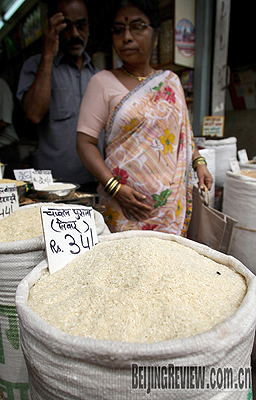|

EATING MORE?: In 2007, per-capita grain consumption in India was 178 kg compared to 1,046 kg in the United States, and less than 400 kg in China
Who is responsible for the soaring food prices around the world? Yang Liqun, an editor at Shanghai-based newspaper Jiefang Daily, argues in an article on July 10 that accusations against developing countries are groundless and do not help resolve the global food problem. Western countries are merely shifting responsibility, Yang says. Excerpts follow:
Rising food prices are not only a highly charged issue in the international community but also topped the agenda of the recent Group of Eight (G8) Summit in Japan. Developed countries have accused emerging economies of forcing food prices up with their growing demand.
German Chancellor Angela Merkel attributed the food crisis to China and India. She said many Indians are eating one more meal than before. "People are eating twice a day, and if a third of 1 billion people in India do that, it adds up to 300 million people," Reuters quoted her as saying. "That's a large part of the European Union (EU)."
"And if they suddenly consume twice as much food as before and if 100 million Chinese start drinking milk too, then of course our milk quotas become skewed, and much else too," she said, referring to EU limits on dairy production.
U.S. President George W. Bush also said increasing food demand in India is mainly responsible for the global food crisis.
In fact, poor countries have proven much more vulnerable to rising food prices. Statistics show that rich Western countries are big food consumers. According to data released by the UN Food and Agriculture Organization in January, per-capita meat consumption was 124 kg in the United States, 89 kg in West Europe and 54 kg in China in 2007. Indians consumed even less meat for religious reasons. Per-capita milk consumption was 268 kg in developed countries, 21.7 kg in China and 90 kg in India in 2005. Per-capita grain consumption was 1,046 kg in the United States, less than 400 kg in China and 178 kg in India in 2007.
Food waste is another serious problem in Western countries. A recent report published by the British Government showed that Britain throws
| 